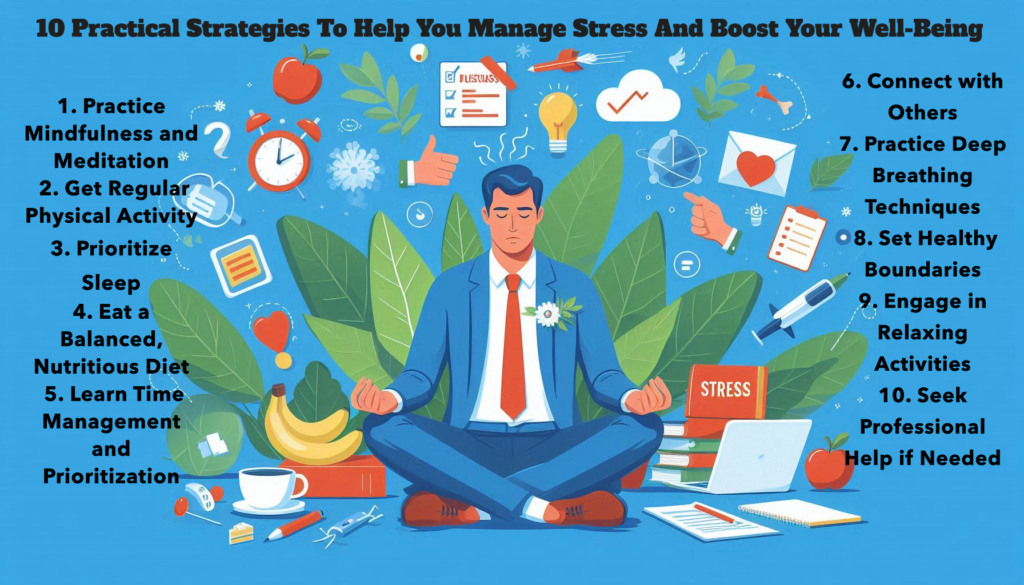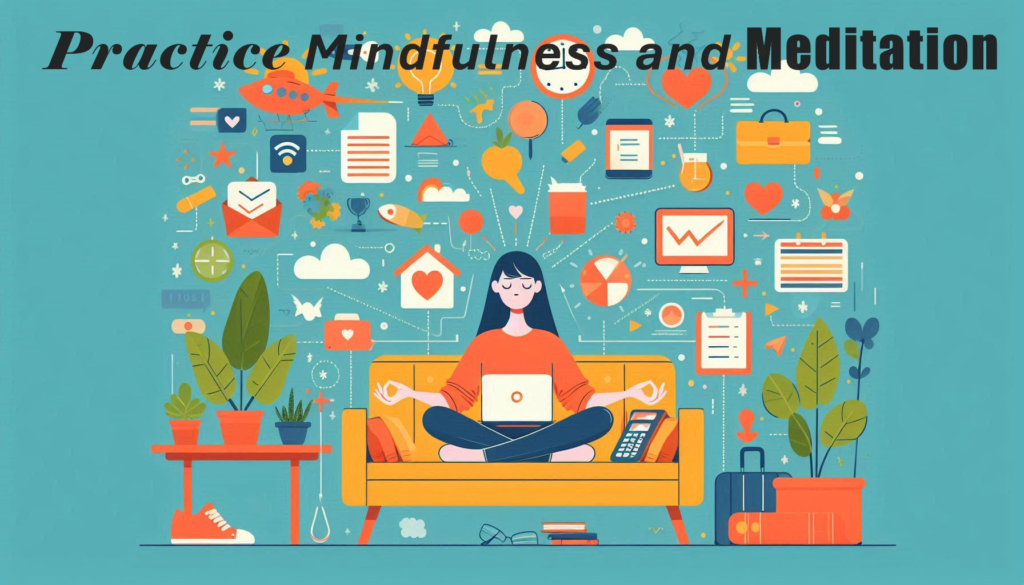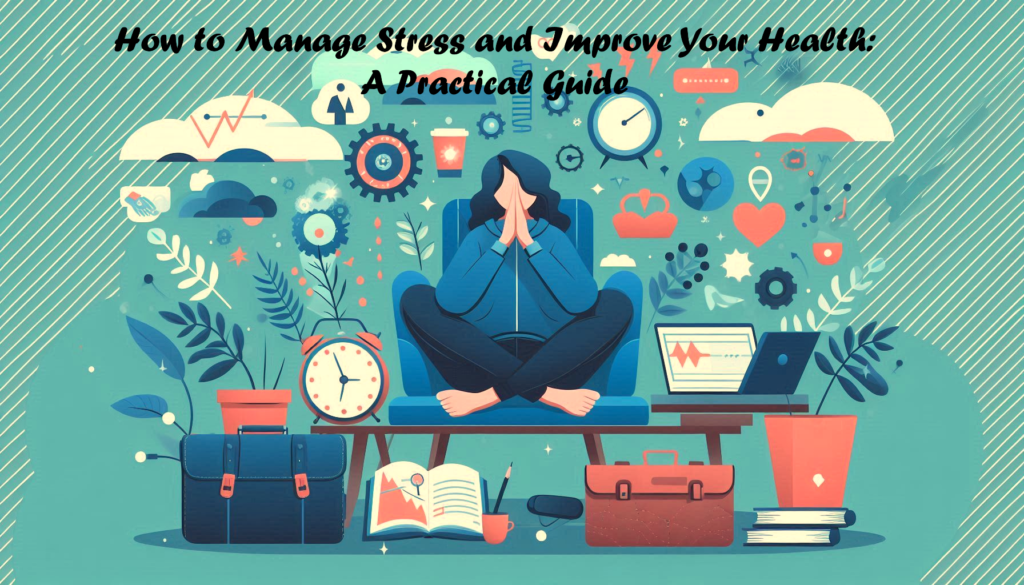How to Manage Stress and Improve Your Health: A Practical Guide, 10 Practical Strategies To Help You Manage Stress And Boost Your Well-Being
Stress is a common part of life, but learning how to manage it effectively is essential for maintaining good health. Chronic stress can negatively affect both your physical and mental well-being, leading to issues like headaches, digestive problems, high blood pressure, anxiety, and depression. Fortunately, there are several effective ways to reduce stress and improve your overall health.

Here are practical strategies to help you manage stress and boost your well-being:
1. Practice Mindfulness and Meditation
Mindfulness is the practice of staying present and fully engaging in the current moment without judgment. Meditation is a powerful way to train your mind to focus and relax. Both can help reduce stress, improve emotional regulation, and increase feelings of peace and well-being.
How to start:
- – Set aside 5-10 minutes daily to meditate.
- – Focus on your breathing, and observe your thoughts without judgment.
- – Use apps like Headspace or Calm for guided meditation.
2. Get Regular Physical Activity
Exercise is one of the best stress relievers. Physical activity increases the production of endorphins, which are natural mood boosters. It also helps reduce the body’s levels of stress hormones like cortisol.
How to start:
- – Aim for at least 30 minutes of moderate exercise most days of the week.
- – Try activities like walking, yoga, swimming, or cycling.
- – Even light exercises like stretching or short walks can make a big difference.
3. Prioritize Sleep
Lack of sleep can amplify feelings of stress and make it harder to cope with daily challenges. Ensure you get enough quality sleep to restore your energy and improve your mood.
How to improve sleep:
- – Maintain a consistent sleep schedule, even on weekends.
- – Create a relaxing bedtime routine (reading, warm baths, or meditation).
- – Avoid screens and caffeine close to bedtime.
4. Eat a Balanced, Nutritious Diet
Your diet plays a significant role in how well you can manage stress. Eating nutrient-rich foods helps keep your body and mind strong, while a poor diet can increase stress and anxiety.
Diet tips for stress management:
- – Eat a variety of fruits, vegetables, lean proteins, and whole grains.
- – Include foods rich in omega-3 fatty acids (e.g., salmon, walnuts) to support brain health.
- – Avoid excessive caffeine, sugar, and processed foods, which can cause energy crashes and mood swings.

5. Learn Time Management and Prioritization
Feeling overwhelmed by tasks and deadlines can significantly contribute to stress. Improving your time management skills can help you feel more in control and reduce stress.
How to manage time effectively:
- – Break tasks into smaller, manageable steps.
- – Prioritize your to-do list by importance and deadline.
- – Use tools like calendars or task management apps to stay organized.
6. Connect with Others
Social support is vital for emotional well-being. Talking to friends, family, or a therapist about your stress can provide relief and new perspectives. Simply spending time with people you care about can reduce feelings of isolation and anxiety.
How to build social connections:
- – Reach out to friends or family regularly, even if it’s just a quick phone call.
- – Join a support group or an online community that aligns with your interests.
- – Spend time with people who make you feel comfortable and uplifted.
7. Practice Deep Breathing Techniques
Deep breathing exercises can help calm your nervous system, reduce tension, and lower stress levels. Practicing deep breathing during stressful moments can have an immediate effect on your mood.
How to practice deep breathing:
- – Inhale slowly through your nose for a count of four.
- – Hold your breath for four counts.
- – Exhale slowly through your mouth for a count of four.
- – Repeat this process for several minutes until you feel calmer.
8. Set Healthy Boundaries
Overcommitting and constantly saying “yes” to everything can leave you feeling drained and stressed. Learning to set boundaries and say “no” when necessary is essential for managing stress and protecting your mental health.
How to set boundaries:
- – Be clear and honest about your limits with others.
- – Practice saying no to requests that would overwhelm you or cause unnecessary stress.
- – Prioritize your own needs and well-being without guilt.

9. Engage in Relaxing Activities
Incorporating relaxing activities into your daily routine is an effective way to relieve stress and improve your mental health. Hobbies and activities that bring joy can give you a mental break from life’s demands.
Ideas for relaxation:
- – Practice hobbies you enjoy, like painting, gardening, or reading.
- – Spend time in nature, whether it’s a walk in the park or gardening.
- – Listen to calming music, practice yoga, or take a warm bath.
10. Seek Professional Help if Needed
If stress becomes overwhelming and difficult to manage on your own, seeking professional help can make a huge difference. Therapists or counselors can offer strategies and tools to manage stress effectively.
When to seek help:
- – If you feel consistently overwhelmed, anxious, or depressed.
- – If stress interferes with your daily life, relationships, or work.
- – If you experience physical symptoms like chronic headaches, insomnia, or digestive problems.
Conclusion
Managing stress is crucial for maintaining a healthy and balanced life. By incorporating mindfulness, regular exercise, a nutritious diet, and healthy social connections into your routine, you can effectively reduce stress and improve your overall well-being. Remember, small, consistent steps can make a big difference in how you feel day to day.
https://optimalhealth.in/optimal-health-and-mind-body-balance-optimal-health/






